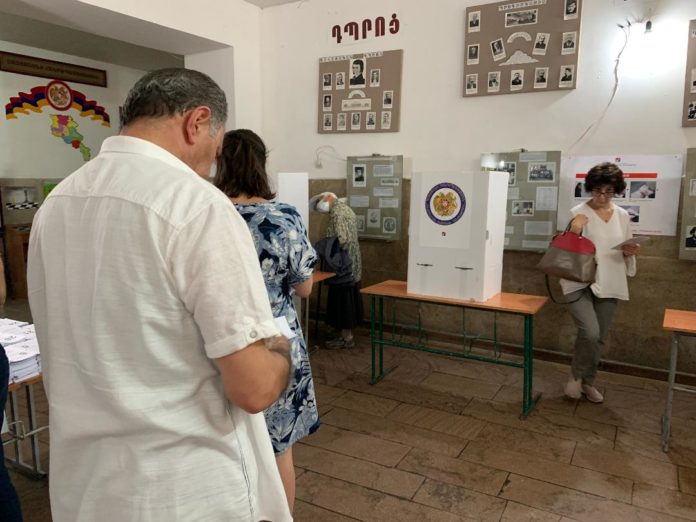YEREVAN — With 100 percent of ballots being counted as of the morning of Monday, June 21, incumbent Prime Minister Nikol Pashinyan is projected to retain a reduced parliamentary majority following a bitterly contested electoral campaign. The election, which took place on Sunday, June 20, was triggered in May when Pashinyan resigned as part of an agreement with opposition parties in a bid to end months of political tension rocking the country in the wake of last autumn’s Azerbaijani invasion of Artsakh.
According to preliminary results announced by the Central Election Committee, the prime minister’s Civil Contract party received 53.92 percent of the vote, enough to form a working majority government. His main rival, an electoral alliance led by former President Robert Kocharyan, which includes the Armenian Revolutionary Federation, finished a distant second with 21 percent. The third force, “I Have Honor,” another electoral alliance which includes former President Serzh Sargsyan’s Republican Party and former National Security Service Chief Artur Vanetsyan, received just over 5 percent. However, electoral rules require alliances to pass a 7-percent threshold to enter parliament, but also necessitates a minimum of three parties, so the final composition of the National Assembly remains to be decided. None of the other 23 other parties and alliances contesting the vote crossed the threshold.
Declaring victory at his campaign headquarters late on Sunday night, Pashinyan spoke of the need to “restore public and national unity” after what many critics have described as a deeply divisive campaign. “The people have given me the mandate to continue to lead this crisis,” the Prime Minister continued, promising to restore peace, secure sovereignty while continuing more aggressive reforms in business, culture and STEM research.
While not outright rejecting the results, Kocharyan’s Armenia Alliance cast doubt on the preliminary figures, calling them “highly controversial.” In their official statement, the alliance insisted that the result did not reflect the “manifestations of public life” which the alliance’s leadership believes had been demonstrated in several polls and in particular, the large pre-election rally held in Yerevan on the eve of the election. They also called for an “in-depth and substantiated investigation into all registered and alleged violations.”
However, the legitimacy of polling results showing Kocharyan either tied or ahead of Pashinyan has been questioned by several analysts. One such polling company, MPG, which confusingly uses the brand name “Gallup International” — despite no affiliation with the American pollster of the same name — has been at the center of controversy for more than a decade. Owned by a former associate of Robert Kocharyan, the company has been described as a “polling mill,” pumping out results tailored to the tastes of clients.
Political consultant Eric Hacopian suggested that the polling conducted by MPG as well as another nebulous Ukrainian pollster were part of a coordinated campaign by the opposition to give the appearance of a race being too close to call, in order to then discredit the voting results.








